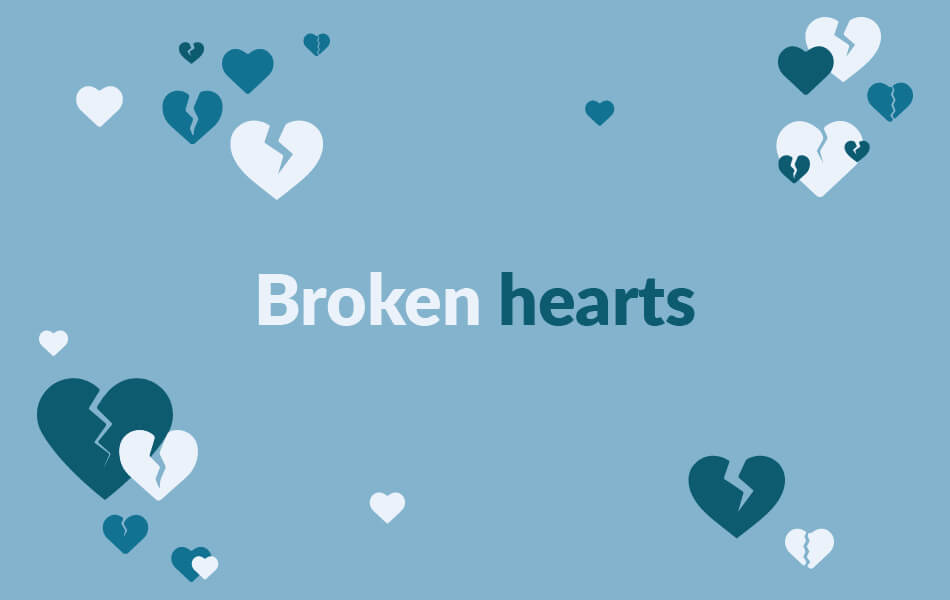Not every Valentine’s Day is all candy and romance
Sometimes you may feel like you can’t breathe or wonder when you’ll ever feel okay again
The day is anything but sweet for those who have lost a loved one, experienced a breakup, or are preparing to divorce or separate. It is possible to develop Takotsubo Cardiomyopathy, commonly known as Broken Heart Syndrome, due to emotional and physical challenges. When you experience heartbreak, it triggers a cascade of emotions that can be overwhelming.
However, even in the midst of this pain, it is important to recognise that healing is possible. With time, understanding, and self-compassion, you can see beyond the hurt and find peace and joy once again.
The pain and sadness can be so intense that it can feel like your world has ended. It can be difficult to see a future without the person you love. When people experience heartbreak, they may succumb to depression, anxiety and, in more extreme cases, post-traumatic stress disorder (PTSD).
But remember, your heart will heal in time, and you can begin to put the pieces back together. Look at our previous article for more information about broken heart syndrome.

The Causes of a Broken Heart
Stress hormones like adrenaline are released when the body is highly stressed, whether it is from a bad breakup or a death of a loved one. Temporarily, these hormones interfere with your heart’s function, affecting even healthy people.
When one experiences Broken Heart Syndrome, they may experience any of the following:
- A disrupted heartbeat rhythm that’s usually normal and steady
- Part of your heart temporarily enlarges (the lower part of your left ventricle)
- Forceful contraction in other areas of the heart.
Temporary heart muscle failure may result from these changes. As mentioned, intense emotional and physical stressors can cause broken heart syndrome. The following are some examples of these stressors:
Sudden emotional stressors include:
- Grief from losing a loved one or other significant losses such as a relationship, home, money or a beloved pet
- Receiving bad news
- Extreme anger
Sudden physical stressors include:
- Severe pain
- Exhaustion from physical events
- Health issues or undergoing surgery
Broken heart syndrome symptoms can appear minutes to hours after a stressful event. You may feel symptoms similar to a heart attack due to the release of stress hormones. The following are the signs and symptoms of broken heart syndrome:
Signs and Symptoms of a Broken Heart
- Angina – sudden, severe chest pain
- Shortness of breath
- An irregular heartbeat (arrhythmia)
- Hypertension (low blood pressure)
- Palpitations in the heart
How Do Broken Hearts and Heart Attacks Differ?
Broken heart syndrome has some signs and symptoms that differ from heart attacks. Symptoms of broken heart syndrome appear suddenly after emotional or physical stress. Here are some ways in which broken heart syndrome differs from heart attacks:
- Heart attack EKG results differ from EKG results for a person with broken heart syndrome.
- Due to a heart attack, blood tests will indicate evidence of heart damage, whereas there won’t be any damage from broken heart syndrome.
- There are no coronary artery blockages, indicating a heart attack.
- Tests reveal ballooning in the lower left chamber of the heart (left ventricle) – also a sign of a heart attack.
- Recovery can take a month or more for a heart attack, while recovery can take days or weeks for broken heart syndrome.
Facts about Broken Heart Syndrome
Broken Heart Syndrome can be difficult to understand, but it can heal and move forward with knowledge and support. Here are some facts we should know about having broken heart syndrome:
- It is not just your mind that feels heavy when you are experiencing profound emotional sadness. It also has a significant impact on your body.
- As a result of your heart getting broken, your immune system reduces, your blood pressure and heart rate may rise, and you may experience significant muscle weakness.
- Heartbreak and grief can flood the body with hormones, specifically cortisol, which can cause chest pain and a heavy feeling.
- Losing someone you love can lead to heart pain, increasing the likelihood of a heart attack.
- A woman’s chances of suffering from Broken Heart Syndrome are ten times greater than a man’s.


